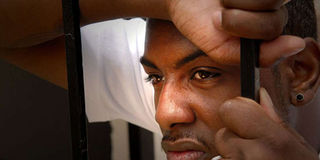Time we stood up for our young men

Being a young man in Kenya is a near-death sentence but it doesn't have to be. PHOTO | FILE | NATION MEDIA GROUP
What you need to know:
- Governance researcher Nanjala Nyabola noted that if you take away major attacks, you're more likely to be killed by a policeman than you are a terrorist in Kenya.
- The police can call anyone an armed robber or drug dealer and with that tag, they have carte blanche and zero accountability.
There's nothing more dangerous in this country than to be a (poor) young man.
Your life hinges on the benevolence of the state. You know that there will be no justice for you if you die. Every young man out there lives knowing this.
A video emerged recently showing a JKUAT student being brutalised by four armed policemen while lying on the ground.
The students were protesting insecurity in the area which had led to murder, rape, and robbery. A story done earlier in the year had intimated how the crooks worked in collaboration with the police.
This wasn't a group of young students (mostly men) on the streets protesting frivolously. This was a demonstration of their lives.
They were rewarded by brutal beatings in broad daylight which were followed by a full night of terror when their houses were broken into by security forces and students were pulled out of their houses and beaten.
This isn't new though. We all remember the infamous photo of Benard Ngatia being beaten and stomped on by police in 2016 during protests for the dissolution of the Independent Electoral and Boundaries Commission (IEBC).
There was uproar but no real action was ever taken, even after he succumbed to the injuries.
UNWARRANTED KILLING
Anyone who isn't afraid of the police as a young man is rich or has rich parents. The state isn't brutal against young men only in protests; it's a daily part of their existence.
My friend Edna's brother was assassinated in broad daylight in Utawala, Nairobi, two years ago.
Police had come to the area and his friends fled because everyone is scared of the police.
Since he had done nothing wrong, he felt that the better option was to stay and talk to them. He was forced to his knees right in front of the boda-boda taxis and shot multiple times at point-blank.
I didn't think much about the police while I was growing up. I had an average middle-class upbringing and one didn't think about these things as a young boy.
UNSAFE SOCIETY
That's until I started getting stopped in my early 20s. I've been arrested twice in this beautiful sin city and both times my crime was walking at night.
Each time at the threat of violence, and knowing that the night isn't the best time to argue with police, I left with my wallet lighter.
The second time I literally emptied my wallet. I was on Loita Street just in front of Nyati House and the way those AK-47's looked seductively at me killed all the resolve I had to not bribe my way out.
I managed to remain unscathed but many more young men do not. They get killed every day and are made to disappear in the name of fighting crime or terrorism.
Governance researcher Nanjala Nyabola noted that if you take away major attacks, you're more likely to be killed by a policeman than you are a terrorist in Kenya. Let that sink in.
It gets even worse when we think about the fact that in many ways the general public has been made to believe that young men are the problem and they've been desensitised to these killings.
The police can call anyone an armed robber or drug dealer and with that tag, they have carte blanche and zero accountability.
FEAR
Stories from slums were best epitomised by the Netflix drama "When They See Us" that is produced by Ava DuVernay.
I remember a retreat I was at when one of the guys narrated a police "operation" in their slum where they were forced to all get into the sewage and swim to entertain the police.
Another one from Mombasa talked about how in the search for terrorists, his friend was assassinated in front of his parents as 'punishment' because they suspected his older brother had gotten recruited by Al-Shabaab.
This violence against young men reflects how they end up as adults. They know they won't get any sympathy, as they are asked what they did or why they were walking late at night.
When I came of age, apart from the fear that I would not get a job, my mother had a lot of fears about my safety.
She would call me especially when there were protests or any form of civil unrest and tell me to stay put and sleep wherever I was.
ENDING DISSENT
She knew that the possibility of getting a call that something tragic had happened to me was very real.
If I was not already sensitised to the dangers of State brutality against protestors, I would encourage people to demonstrate.
But I was part of protests against extrajudicial killings in 2017 after the first election where we were clobbered and shot at.
I remember running so hard and hiding in the CBA Bank on Mamlaka Road as armed police followed us.
Still, we need to speak up for our young men. Violence against them isn't normal. Violence against them can't be normalised. Being a young man in Kenya is a near-death sentence but it doesn't have to be.





